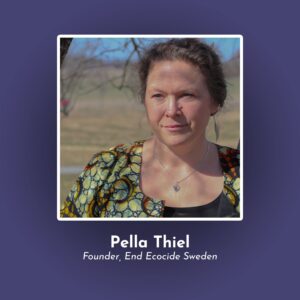
Show Summary
On this episode, Nate is joined by maverick ecologist Pella Thiel to discuss the legal frameworks behind the Ecocide and Rights of Nature Movements. Our current economic and legal systems have no mechanisms to consider nature in our decision making – much less to make systemic planetary stability a priority. Could redefining the destruction of our biosphere to be considered a crime parallel with that of genocide alter the way we structure laws governing our societies and economies? How are countries legislating and enforcing these ideas – even going so far as to act against the flow of the superorganism? Most importantly, how could top-down legal ideas such as these interact with bottom-up individual action to create powerful shifts in cultural values and motivations?
About Pella Thiel
Pella Thiel is a maverick ecologist, part-time farmer, full-time activist and teacher in ecopsychology. She is the co-founder of Swedish hubs of international networks like Swedish Transition Network and End Ecocide Sweden and a knowledge expert in the UN Harmony with Nature programme. Pella was awarded the Swedish Martin Luther King Award in 2023 and the Environmental Hero of the year 2019.
In French, we have a motto that says that a simple drawing is often better than a long explanation. Jean-Marc Jancovici Carbone 4 President
That’s very understandable because with left atmosphere thinking, one of the problems is that you see everything as a series of problems that must have solutions. Iain McGilchrist Neuroscientist and Philosopher
We can’t have hundreds and hundreds of real relationships that are healthy because that requires time and effort and full attention and awareness of being in real relationship and conversation with the other human. Nate Hagens Director of ISEOF
This is the crux of the whole problem. Individual parts of nature are more valuable than the biocomplexity of nature. Thomas Crowther Founder Restor
Show Notes & Links to Learn More
Download transcript00:00 – Pella Thiel works + info, Reality Roundtable on Local Food systems, Transition Town Sweden, Ecocide, Rights of Nature
02:39 – Yasuní National Park Ecuador, native tree species in Sweden, The U.S., and Ecuador
03:20 – Ecuador has 1,500 species of birds while the continental U.S. has 800
04:40 – Polly Higgins
05:05 – Olof Palme, First prime minister to use the term ‘ecocide’
05:45 – Crimes against peace, international criminal court
09:14 – Ecocide treaties and conventions
13:29 – 15% of emissions are from fossil fuel companies themselves and 85% from consumers
15:51 – Pension funds used for fossil fuel extraction, legal rights
17:55 – Effects of Sweden outlawing child beating in the 1970s
21:08 – Industrial fishing in the Baltic Sea
22:31 – Belgium first European state to legislate national and international ecocide crimes
22:48 – EU including ecocide principles in the new environmental crime directive
23:09 – UN Environmental Programme
23:13 – Al-Mizan: A Covenant for the Earth charter including ecocide
26:23 – Wes Jackson
28:01 – Post-tragic
29:31 – Department of Natural Resources
33:46 – Overton Window
33:55 – ICC Policy Paper on Environmental Crimes Responses regarding ecocide
34:36 – Panama Rights of Nature legislation, Declaration of Panama’s Largest Copper Mine Unconstitutional
38:21 – Donella Meadows, Iceberg
42:10 – Pollution in the Baltic Sea, crashing fish populations
44:20 – More than 30 countries implementing Rights of Nature, Ecuador the first within its constitution
48:27 – Thomas Berry
49:58 – Cormac Cullinan
50:49 – Inclusion of rights of nature into the Convention on Biodiversity
52:19 – Ecuador referendum to end oil extraction in Yasuní
52:59 – Indigenous knowledge and the Rights of Nature
58:15 – Naturlagen
58:39 – Buckminster Fuller
1:01:51 – Environmental activists’ deaths
1:03:15 – Angela Davis
1:05:08 – Robin Wall Kimmerer
1:11:12 – Alexa Firmenich, TGS Episode, Sit-spot
1:14:02 – School Gardens
Links to learn more:
‘Ecocide in Gaza’: does scale of environmental destruction amount to a war crime?







